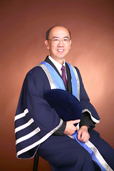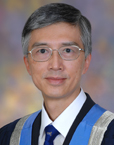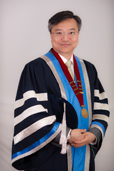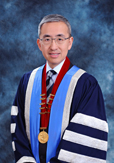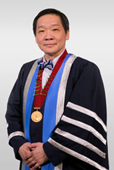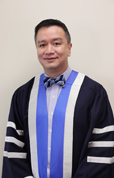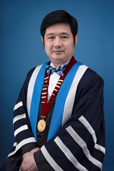History
The Hong Kong Orthopaedic Association was formed in 1965 with Prof Hodgson as the first President. Academic and social functions for the Orthopaedic fraternity in Hong Kong were organized by the HKOA. In 1983, the Board of Orthopaedic Surgery with Prof John Leong as Chairman was set up under the auspices of HKOA. The role was to organize and coordinate programmes for our junior Orthopaedic trainees. The first local FRACS Exam was held in 1985. |
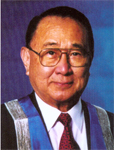 Prof. Sir Harry Fang |
Around 1987, the general surgeons in Hong Kong were preparing to set up a College of Surgeons and invited Orthopaedic surgeons to join them as a Faculty. After a lot of discussions and deliberations, we decided to set up our own College, the Hong Kong College of Orthopaedic Surgeons (HKCOS), independent of the surgeons. The first AGM was held on 30 April 1987. Prof Sir Harry Fang was elected President. Prof John Leong was Vice President and Prof PC Leung was Censor. The other workhorses included Dr York Chow as Hon Secretary and Dr David Fang as Hon Treasurer. We became one of the first specialty colleges to be formed, only after the HK College of General Practitioners. Dr Keith Halnan’s report stipulated the formation of the HK Academy of Medicine with 7 colleges and 6 faculties. We were relegated to a faculty under the yet to be formed College of Surgeons. After long and hard lobbying, HKCOS was elevated to College status in 1990. |
In Jan 1993, Prof PC Leung was elected President. Together with Dr David Fang and Dr York Chow, they worked hectically to iron out the differences between our Constitution and the HKAM Constitution. On 9 December 1993, the HKAM inauguration was officiated by Governor Chris Patten. HKCOS became one of the 12 Colleges under this statutory body, with 116 Orthopaedic Surgeons admitted as Foundation Fellows. Meanwhile, the Australasian College had stopped coming to HK after the Apr 1991 examination. At the same time, the Education Committee had been working earnestly on the future model of Orthopaedic training. Finally it was decided that it should be a 6 years training with an entry examination after the first 3 years. The first local HKCOS Examination was conducted in Oct 1994 with Prof Sean Hughes and Mr Souter as external examiners. Hospital accreditation was conducted with our overseas experts. |
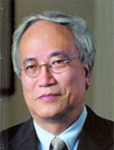 Prof. PC Leung |
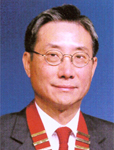 Prof. John Leong |
Prof John Leong presided over HKCOS in 1995 to 1996. At that time, having a conjoint examination was only a minority view in the Royal College of Surgeons of Edinburgh. Our Council worked fervently to change this. Eventually, the first conjoint Examination with RCSEdin was held in 1997. Successful candidates were awarded the diplomas of both the HKCOS and the Edinburgh College. The Continuous Medical Education Sub-committee was set up in 1996 when Prof KM Chan was Censor. Fellows were required to report their continuous medical education activities. |
Prof KM Chan became President for 1997-98. The first Newsletter was published in 1997 to foster better communication with our Fellows. In collaboration with HKOA, we established our HK Journal of Orthopaedic Surgery in 1997 with Dr WC Wu being the Editor-in-chief. With the HKAM Building ready, we started to move into our own office in late 1998. In previous years, Council meetings were held in the HK Country Club only. A manpower survey was conducted, led by Dr PY Lau, giving a full picture of the existing manpower situation and projection of future needs. |
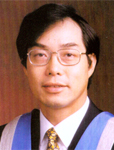 Prof. KM Chan |
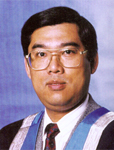 Prof. Keith DK Luk |
Prof Keith DK Luk took up the Presidency for 1999 to 2000. Curriculum review was initiated when Prof Luk was Censor in the previous Council. Many specialists in various fields helped to compile a Core Curriculum for Orthopaedic Training which was published in 1999. The Council initiated discussion with mainland Chinese institutions and the Chinese Orthopaedic Association on the standardization and accreditation of Orthopaedic training in China. HKCOS is one of the first Colleges developing in this area. The Exam in 2000 was the first time that a Singaporean candidate participated. However, in an earlier EGM, Fellows voted not to grant FHKCOS to successful candidates from outside of Hong Kong. Our College website was set up with the help of Dr Eric Chien. We employed our first full time staff Ms Irene Yu as executive secretary in 2000. There had been ongoing discussions with the HK College of Physicians in the previous few years on the development of rehabilitation subspecialty. Prof Sir Harry Fang, Prof PC Leung, Dr MS Wong and Dr YC So formed a working group to study this matter. In line with the change in UK from FRCS to AFRCS and MRCS, new trainees would change to a new 2 + 4 years of training programme. |
Dr SH Yeung was the President for 2001 to 2002. A Tutorial programme was set up by Dr WK Ngai, with specialists tutoring higher trainees in small groups according to their class. The meeting files of our Saturday Interhospital Meetings were compiled into Orthopaedic Grand Round by Dr CW Chan. This was sent out to all colleagues as CD-ROMs and also published in our website. An examiners¡¦ course was conducted in 2001. With the active participation of 40 Fellows, this Course marked the first step taken by the College to unify the concept and methods adopted by potential local examiners and hence to improve the consistency and reliability of the Examination. The number of local examiners participating in each examination was reduced so as to increase the consistency in the assessment and marking in the examination. |
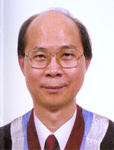 Dr. SH Yeung |
A Retreat for all Fellows was held in 2002, discussing on the development of rehabilitation, manpower, subspecialization and link with China. A new Working Group on Orthopaedic Rehabilitation was formed with Dr York Chow as Chairman and Dr MS Wong as coordinator. The curriculum was prepared. HKCOS and HKOA co-organized the Beijing Hong Kong Exchange Conference with Chinese Medical Association and HKMA in Oct 2001. The HKCOS Research Grant was set up as a new alternative source of funding, especially useful for colleagues not working in university hospitals for their research projects. |
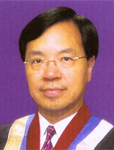 Prof. KS Leung |
The President for 2003-04 was Prof KS Leung. SARS struck HK in 2003. Training activities were slightly affected but the work of the Council continued. Development of the Rehabilitation subspecialty continued with the help of Dr SY Chun and other colleagues. Over 100 First Fellows were admitted. The Orthopaedic Rehabilitation Subspecialty Board was formed with Dr Chun as Chairman. The Conferment Ceremony was held together with Rehabilitation Workshop in Oct 2004, attended by many local and international honorable guests. HKCOS and HKOA co-organized an exhibition titled “The Past and the Present of Orthopaedics” at the Museum of Medical Sciences from Aug to Oct 2003. HKCOS also collaborated with HKOA in publishing a monograph “Half a Century of Orthopaedics in Hong Kong”. The Chief Editor was Dr KT Chan. It was launched at a big press conference during the HKOA Annual Congress in Nov 2004. The public was informed of the rapid advancement in Orthopaedics during this time. |
To follow up on the manpower issue from the previous Retreat, this Council worked towards controlling the intake of Higher Orthopaedic Trainees to five a year from Jul 2005. On external relationships, this Council continued to liaise with the Chinese Orthopaedic Association. Chinese surgeons were invited to observe our examinations. The Council discussed with the American Academy of Orthopaedic Surgeons on the collaboration in training and the sharing of educational material. |
Dr PY Lau assumed the Presidency for 2005-06. Relationship with Mainland China developed rapidly. HK Academy of Medicine signed a Memorandum of Undertaking with the Ministry of Health, with Orthopaedics being one of 4 specialties for pilot cooperation. There was a lot of discussion with our Chinese counterparts. Dr Lau visited Beijing several times, and visited the Jishuitan Hospital (JST) with Mr John Smith, President of RCSEdin, and Dr Samuel Kwok, President of CSHK in Mar 2006. At the College EGM in May 2005, it was decided that we shall accept mainland doctors to sit for our fellowship examination after accredited training which is comparable to ours. In Oct 2006, 6 candidates from JST came to HK for the MRCS and 5 passed the Part I and Part II exam. A preparatory course was organized for JST trainees in Beijing in Dec 2006 with the help of Dr KH Mak and Prof WY Lau. The 5 candidates came to HK from Jan to Mar 2007 for attachment. |
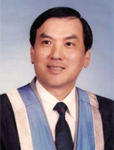 Dr. PY Lau |
HKCOS together with HKOA co-organized with the Chinese Orthopaedic Association their First International Congress in Nov 2006 in Beijing. A total of 92 delegates joined this great meeting and many visited the JST Hospital. On Rehabilitation Subspecialty, annual congresses were held and regular didactic lectures started. Dr SY Chun, the Chairman of the Board visited Helsinki, Finland. Agreement was made to allow our trainees to attach to the ORTON and Synapsia Centres for rehabilitation training. Orthopaedic rehabilitation training centres in HK were inspected and the first batch of trainees enrolled. HKCOS participated in a series of health talks on Orthopaedic subjects on the Radio Television HK in 2005. HKCOS co-organized the final programme of the Quincentenary celebration of RCSEdin in HK in Oct 2006. HKCOS organized a very successful International Symposium on Disaster Medical Response in Dec 2006. It was well attended by our colleagues, doctors of other specialties, Red Cross, Police, Security Bureau, Fire Services etc. Due to the changes in contract situation of trainees, the fellowship examination was moved from Dec to May from 2005 onwards. |
